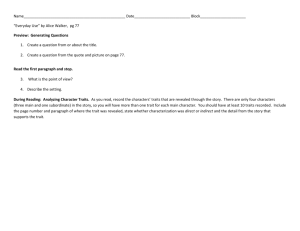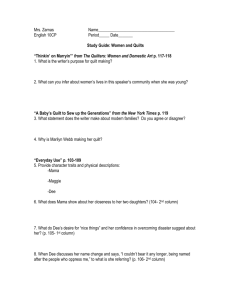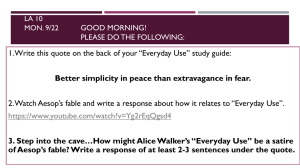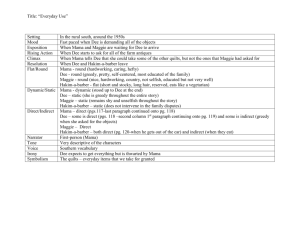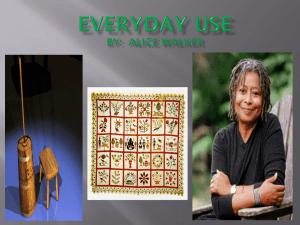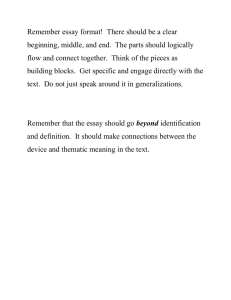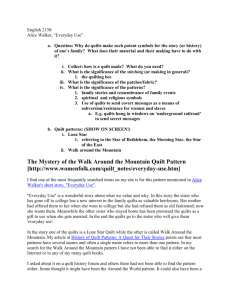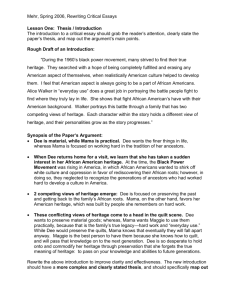49782051 黃寶兒 Connie Wong Literary Criticism(1) 10th January
advertisement
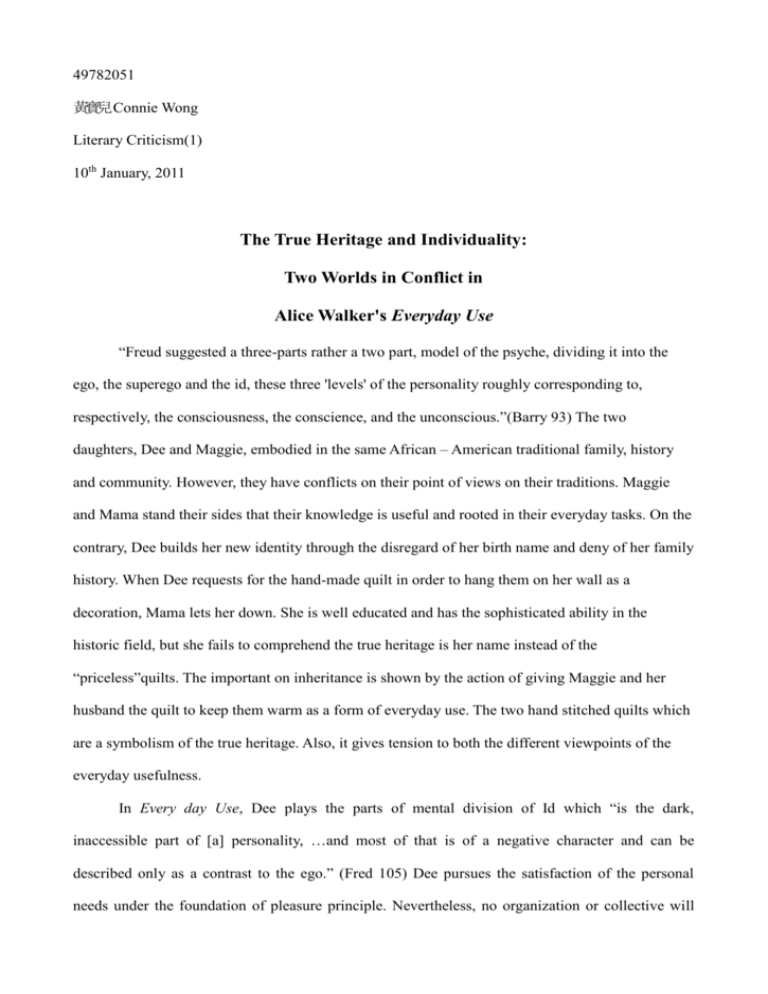
49782051 黃寶兒 Connie Wong Literary Criticism(1) 10th January, 2011 The True Heritage and Individuality: Two Worlds in Conflict in Alice Walker's Everyday Use “Freud suggested a three-parts rather a two part, model of the psyche, dividing it into the ego, the superego and the id, these three 'levels' of the personality roughly corresponding to, respectively, the consciousness, the conscience, and the unconscious.”(Barry 93) The two daughters, Dee and Maggie, embodied in the same African – American traditional family, history and community. However, they have conflicts on their point of views on their traditions. Maggie and Mama stand their sides that their knowledge is useful and rooted in their everyday tasks. On the contrary, Dee builds her new identity through the disregard of her birth name and deny of her family history. When Dee requests for the hand-made quilt in order to hang them on her wall as a decoration, Mama lets her down. She is well educated and has the sophisticated ability in the historic field, but she fails to comprehend the true heritage is her name instead of the “priceless”quilts. The important on inheritance is shown by the action of giving Maggie and her husband the quilt to keep them warm as a form of everyday use. The two hand stitched quilts which are a symbolism of the true heritage. Also, it gives tension to both the different viewpoints of the everyday usefulness. In Every day Use, Dee plays the parts of mental division of Id which “is the dark, inaccessible part of [a] personality, …and most of that is of a negative character and can be described only as a contrast to the ego.” (Fred 105) Dee pursues the satisfaction of the personal needs under the foundation of pleasure principle. Nevertheless, no organization or collective will can be found in her. Names are extremely important in African and African American culture as a means of indicating a person's spirit. Also, their names do represent a family unity and heritage. Dee, her original name, is actually a form of treasurable inheritance given by her family. Being adopted her ancestor's name, she builds a connection with her beloved family members. But, she seeks in the way of commemorating her Grandma Dee with the quilts. Furthermore, she gains the dignity by changing her name into Wrangero Leewanika Kemanjo. One can probably traced back to her family history “back beyond the civil war.”(Walker 459) Wrangero gives up the right of inheriting this valuable element and is contented with a new name sounded authentically African. There is no relationship to people who she knew and no personal history included in this name. When Dee was “sixteen she had a style of her own: and knew what style was.”(Walker 454) But, her intention of getting self-independence brings about in a state of chaos. In one hand, she strongly realises naming after Big Dee as an insult and cannot bear it no longer. In another hand, she wants so much to get the quilts done by the one who oppressed her. Ego is another type of structural apparatus mentioned before. Maggie “seeks to please the id’s drive in realistic ways that will benefit in the long term rather than bringing grief.” (Fred 110) Maggie is uneducated and backward nature who receives from life whatever she is given, just as the quilts made by her scarred hands. But, Maggie is ashamed of being a burnt victim in the fire that destroyed their first home. Even when she is facing her Mama, she hides her thin body in a pink skirt and red blouse behind the door. Also, she walks with “chin on her chest, eyes on the ground”(Walker 453) after the accident of the fire. In one hand, Dee is always the one who spoiled by her mother. Around her elder sister who is lighter than her, with nicer hair and a fuller figure, “She has a mixture of envy and awe. She thinks her sister had held life always in the palm of one hand, that 'no' is a word the world never learned to say to her.”(Walker 453) In another hand, Maggie is more than the girl who hides from the world and concedes to a truth that tells her “she is somebody used to never winning anything, or having anything reserved for her.”(Walker 459) In the incident of Wrangero urging for Mama's heritage, she starts their conversation on asking for the quilts in a voice as "sweet as a bird” and turns in a furious emotion. She shows she is the one who worth to owe the old quilts by saying the quilts are priceless in the competition of getting the heritage instead of Maggie. Dee concludes that she is the best choice to be the owner of the quilts and the only one who can truly appreciate them. She gives a look down description of “Maggie's brain is like an elephant's”(Walker 457) and will destroy them by putting them in everyday life. She resists that Maggie is incapable of appreciating the quilts. In the argument on getting the quilts, Mama keeps on reminding her that she once refused to take one of the quilt to quilt under the reason of old fashioned and misfit in her style. She pretend to be an expert on the handmade things and gives a wrong description that they “were all hand stitched by grandma herself and all the cloth came from grandma Dee's dresses.”(Walker 457) When Mama keeps on asking question about those quilts, Wrangero fails to achieve an accurate answer. In fact, Mama tries to offer more information on the true history of the quilts by pointing out that the lavender material is from her great grandmother. They comes from “Bits and pieces of Grandpa Jarrell's paisley shirts. And one teeny faded blue piece, about the size of a penny matchbox, that was from Great Grandpa Ezra's uniform he wore in the Civil War.”(Walker 457) Mama knows the names of the quilt patterns which are the Lone Star and Walk Around the Mountain. Also, Maggie knows the skill of quilt. Both of them conduct an intimate knowledge and appreciation of the family's heritage. Wrangero could only exclaim the word "Imagine!" which shows her impatient on listening to the explanation of Mama and Maggie in her family history. Maggie“can remember Grandma Dee without those quilts [and she agree that Wrangero] can have them.” (Walker 459) When Wrangero almost succeeds in taking the quilts from Maggie, Mama conceived that the quilts can never belong to her. Maggie has inherited what the quilts embody. Wrangero doesn't mull over how important the people are behind the quilts. Maggie doesn't need the quilts to remember Big Dee, her aunt and Grandma Dee who made the quilts. These women whose name “Dee” has been rejected by Wrangero. In the same time, Maggie is taught the art of quilt making. The ability to create them by herself and carries her heritage inside. Maggie herself becomes a part of the heritage of her family. Her heritage is the skill and knowledge that she can apply to everyday use. It is something she can bring to life and create. In the beginning, Wrangero rejects the names of her ancestors, then she vigorously values their old handmade items. Grandma Dee’s butter dish with the churn top and the dasher are examples of the items that she asked for. “Everything delighted her. Even the fact that we still used the benches her daddy made for the table when we couldn’t afford to buy chairs.” (Walker 456) Wrangero explains her motivation for wanting these items. She “can use the churn top as a centerpiece for the alcove table and I’ll think of something artistic to do with the dasher.” (Walker 457) The elder sister wants these items to decorate her house. Even though Wrangero may seem socalled value on these items, they are nothing more to her than the artistic objects. It is impossible for her to present them as an important part of her heritage. Her family made these things under the intentions of having a convenient life or disable of affording one. But, she wishes to display the handmade objects as a form of art decoration for her house rather than adopting the true heritage. Due to the fact that Maggie could get the handmade quilts, brings Dee back to reality. Neither understanding the true meaning of heritage nor having a connection with her ancestor, Wrangero is excluded from the family ties. Throughout her life, she has she endures being a outsider of the traditional world. With her outside education, she depreciate the way Maggie and Mama have lived . Due to the deficiency of trust in her true inheritance, she gets independence through changing her birth name. Because of arrogance and ruthless, she is drove into individuality. Ultimately, the story ended as Maggie gives a real smile. The two women sit in the yard and enjoy the precious moment until it was time to go in the house and go to bed. The consensus of their everyday usefulness and their acceptance of the traditional values bounded them together in the intimate way that Wangero will never understand. Maggie who knows the skill of quilting and put them in everyday use. It was Grandma Dee and Aunt Dee who taught her how to quilt herself. In this way, she can teach her daughter to quilt and member their forefathers by their hands. The quilts will speak for them, forever and ever, and witness the true heritage. Their knowledge and wisdom on household are going to pass from a generation to a generation. Work Cited Walker, Alice. “Every day use.” An Introduction to Literature, 2004. Vol.13. 452-459. Barry, Peter. Beginning theory USA: Manchester University Press, 2009. Vol. 3. 93 Fred, Sigmund. New Introductory Lectures on Psychoanalysis, 1933.105-110
